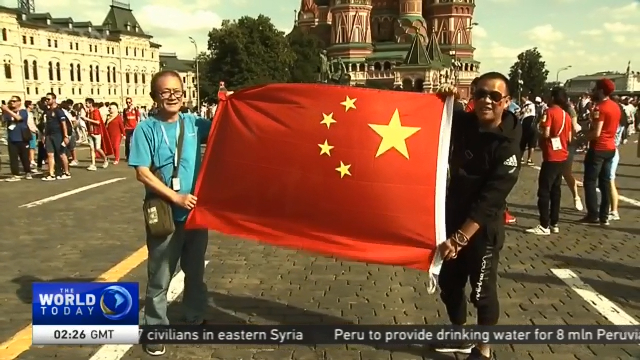
10:49, 23-Jun-2018
World Cup 2018: The rise of Chinese fans and corporate sponsors at the tournament
03:50

The World Cup continues in Russia with goals, excitement and plenty of drama. But off the pitch, one noticeable element at the tournament is the boom in interest amongst Chinese fans. Four years ago in Brazil, only 7,400 World Cup tickets were sold to Chinese supporters. This time around, the figure is more than 40-thousand tickets. And that's not the only Chinese interest in Russia, as CGTN's Dan Williams now reports.
A melting pot of cultures as fans from around the world enjoy Russia 2018. Among them, a significant number of supporters from China. More than 40,000 tickets were sold to Chinese supporters. A huge increase from 7,400 that were sold to Chinese fans in 2014. And that's despite the country's national team failing to qualify for the tournament. But it's not just in ticket sales where China's presence is being felt. Seven of the nineteen corporate sponsors are Chinese. Top television maker Hisense, smartphone-maker Vivo and Chinese real estate and leisure conglomerate Dalian Wanda all have towering activations at World Cup venues. FIFA says the trend simply reflects the changing global market place.
PHILIPPE LE FLOC'H FIFA CHIEF COMMERCIAL OFFICER "It's companies were initially focusing on the domestic market. But now they understand or they've come to the point where they control the domestic market and they want to go abroad. And there was a bit of a natural fit with the biggest sport on earth. The property has a global foot print. And it was easy for them to go abroad using the most popular sport on earth."
Football sponsorship comes at a price with each one worth hundreds of millions of dollars. Russia's Lokomotiv Moscow also has a sponsorship deal with Vivo. The club's Commercial Director Igor Smirnov believes the relationship is win-win.
IGOR SMIRNOV LOKOMOTIV MOSCOW COMMERCIAL DIRECTOR "There is nothing more fitting than the fact that companies who want their products to reach customers all over the world choose football, with its mass appeal, as one of the most popular sports worldwide."
In 2015, a corruption scandal engulfed FIFA and saw dozens of football officials arrested or banned from football activity. It also led to a number of companies refusing to renew their sponsorship deals. That though opened the door for other companies to fill that void.
DAN WILLIAMS MOSCOW "The huge increase in Chinese football supporters at this World Cup along with those new sponsorship deals underlines the boom in interest in the game in China. It also raises the prospect of a bid by China to host the tournament in future years."
PHILIPPE LE FLOC'H FIFA CHIEF COMMERCIAL OFFICER "It's a big country. It's a sports country. They have hosted winter and summer Olympics. They will host the winter Olympics soon. They would have hosted athletics world championship. I think it makes sense that China to be willing host the biggest sport event on earth which is a World Cup."
The joint bid of the U.S., Mexico and Canada recently won the hosting rights for the 2026 tournament. It means the next available World Cup is 2030.
KEIR RADNEDGE FOOTBALL JOURNALIST "I think taking a work cup to China is an obvious step. FIFA wants to go to the big countries for lots of reasons, it is to do with promotion it is to do with development. If you want to see the game develop then China is an obvious market that is waiting to be tapped."
In the meantime, Chinese fans along with supporters from around the world continue to enjoy the games. But it might not be long before China also gets a chance to host football's showpiece event. Dan Williams, CGTN Moscow.

SITEMAP
Copyright © 2018 CGTN. Beijing ICP prepared NO.16065310-3
Copyright © 2018 CGTN. Beijing ICP prepared NO.16065310-3